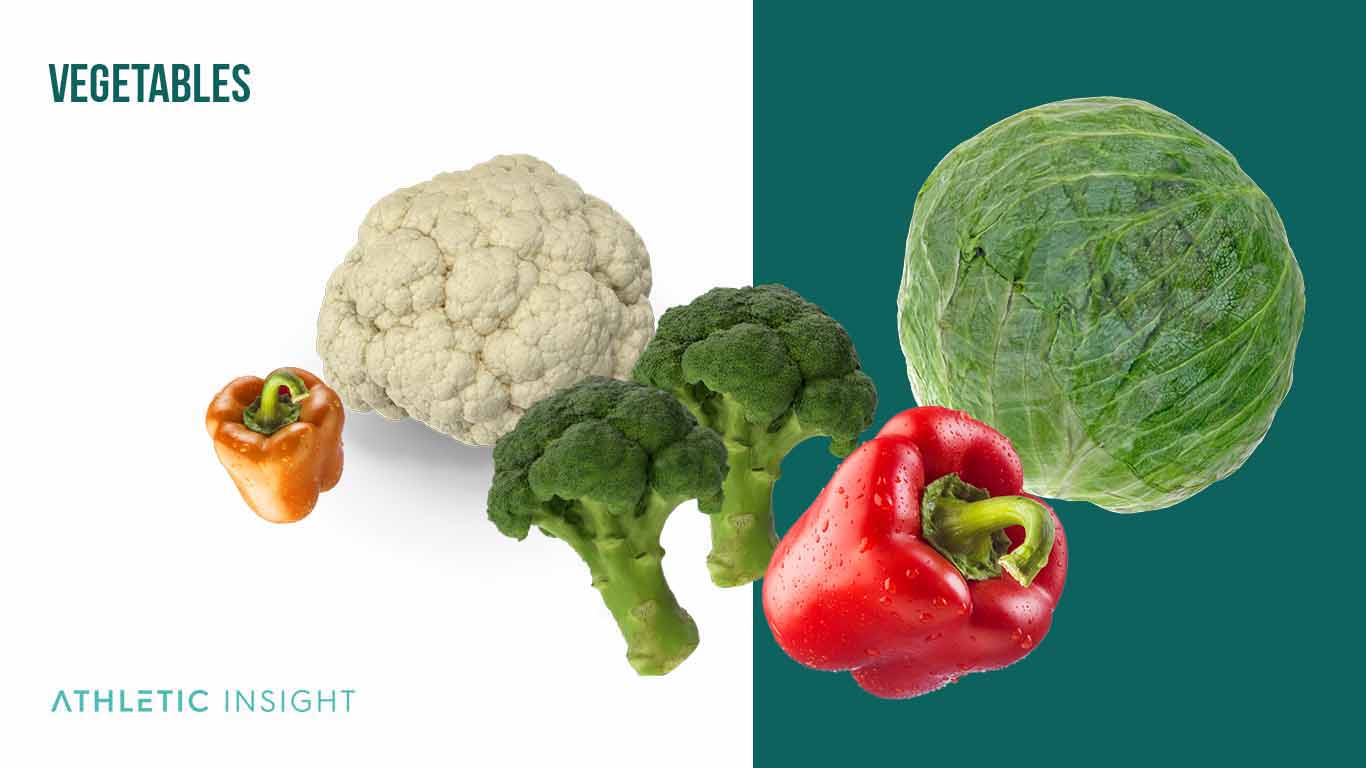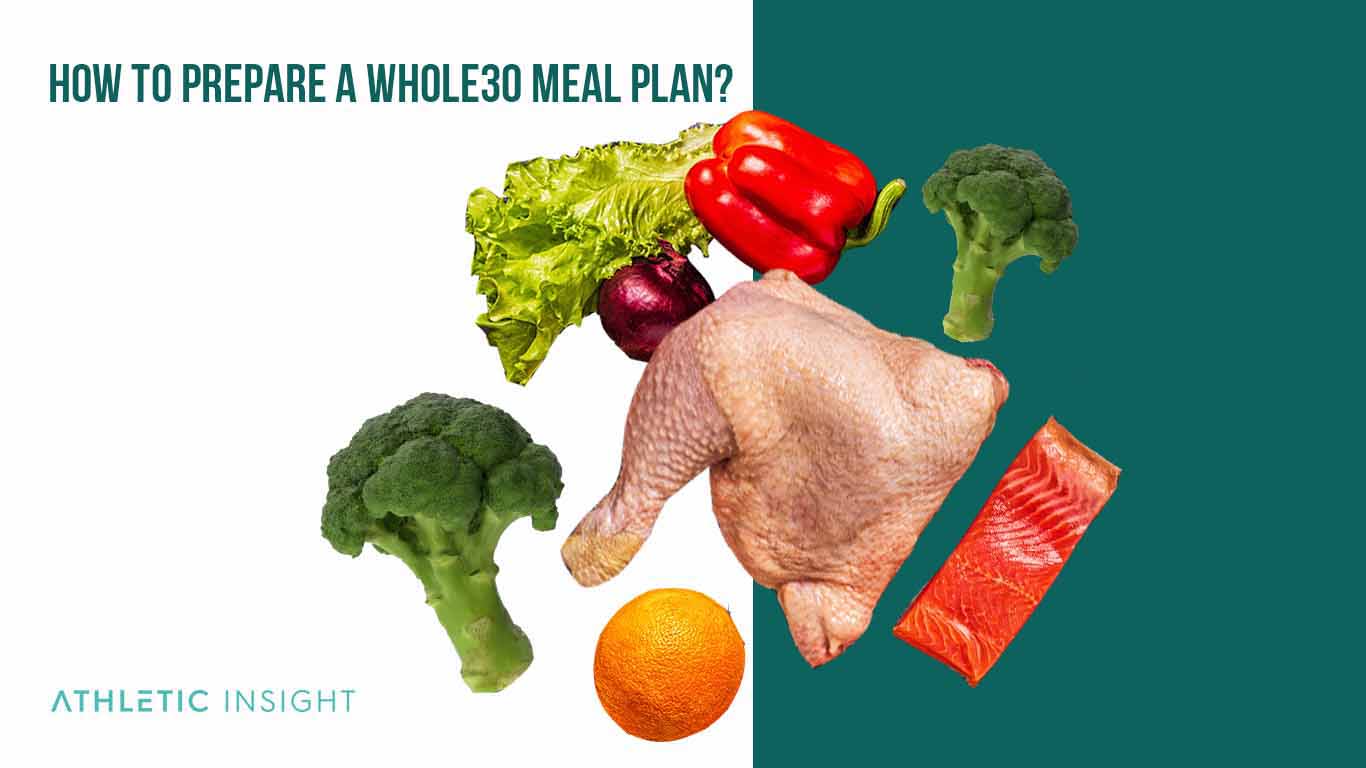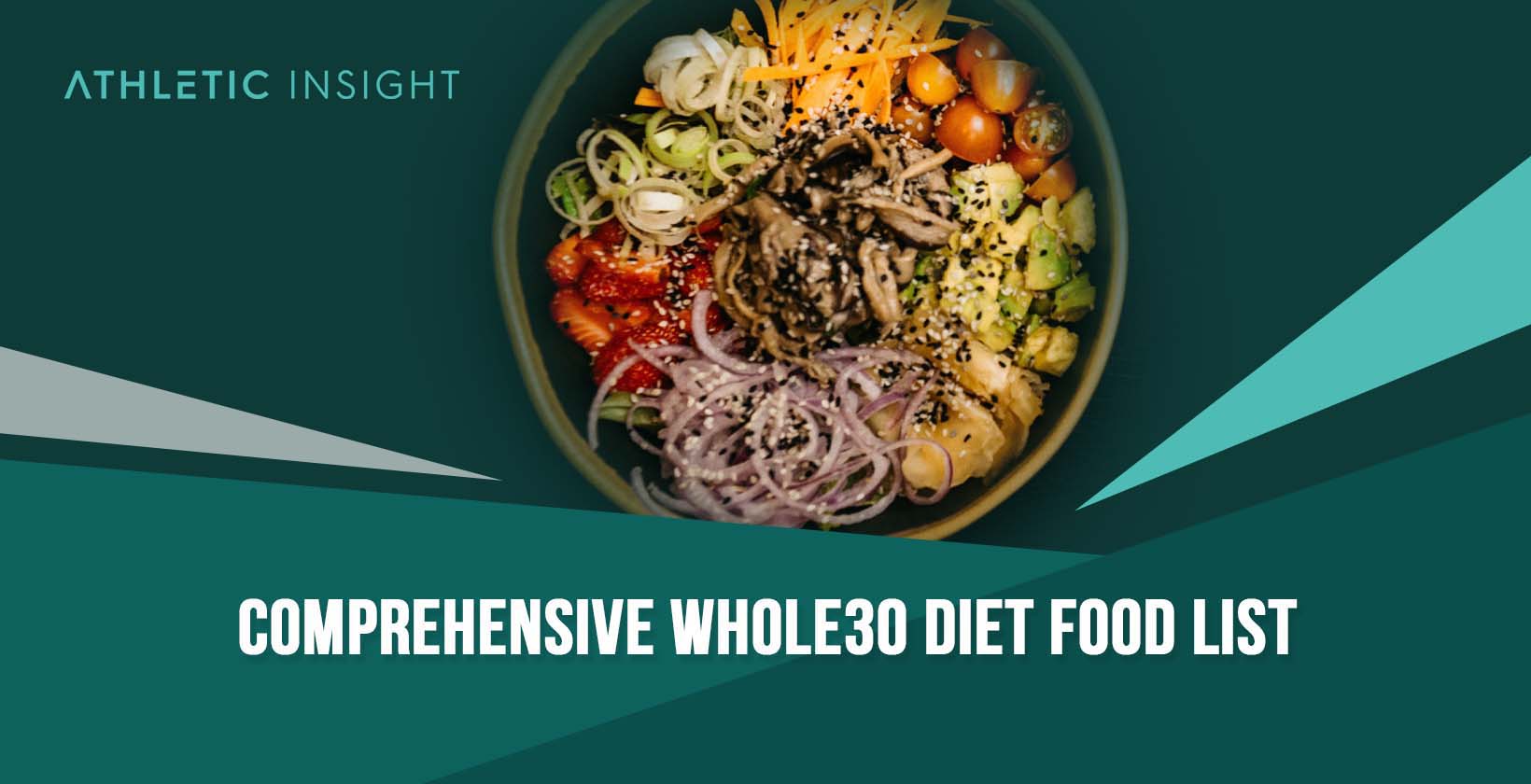The Whole 30 diet food list provides approved foods for anyone on the Whole 30 diet. Finding the correct food list to follow will help guide those on the Whole 30 meal plan diet through what foods to avoid and eat.
Five primary categories of food are approved on the Whole 30 food list. Those categories include the following.
- Vegetables
- Fruit
- Protein
- Fats and oils
- Beverages
Following the close, specific guidelines for what is considered Whole 30 approved foods will help those on a diet know what to eat and what to skip.
Anyone on the Whole 30 day diet needs to have a defined food list, which will allow those on a diet to make weekly meal plans that do not stray from the diet requirements.
Finding the right foods you can eat on Whole 30 makes sticking to the diet more accessible.
1. Vegetables
Vegetables are a staple in the Whole 30 diet. Here are some of the vegetables you can eat while you’re on the Whole 30 diet.

- Acorn squash
- Arugula
- Cabbage
- Brussels sprouts
- Zucchini
- Cauliflower
- Sweet potato
- Asparagus
- Mushrooms
This is just a short list of the approved vegetables. As a general rule, anyone on the Whole 30 diet can eat all vegetables. Vegetables are a critical part of the diet because they are full of helpful vitamins and minerals and a natural source of good fiber and other necessities.
On the Whole 30 diet, you can consume as many vegetables with each meal as you desire. There is no limit other than the overall calorie limit that governs each day on a diet.
Most vegetables are not high in protein content, so you will not be able to get a significant portion of your daily protein from veggies.
Vegetables won’t be the primary source of fat in your diet. You can add a small helping of fat by cooking your veggies with a tablespoon or two of oil.
2. Fruit
You can eat many different types of fruit while on the Whole 30 diet. Some of the fruits included on the approved food list for Whole 30 are as follows.

- Strawberries
- Watermelon
- Apples
- Oranges
- Bananas
Fruit is high in vitamins and phytochemicals that help improve overall health. Since they are also low in calories, they won’t ruin your goals with Whole 30. Fruit is also essential for gut health and hydration.
Two total servings of fruit each day is acceptable with the Whole 30 diet. Eat the servings of fruit with a meal, typically lunch and dinner.
Fruit is not high in protein, so as with vegetables, your fruit consumption will not impact your daily protein goals on the Whole 30 diet.
Besides avocado, fruit is extremely low in fat. That means you won’t impact your daily fat intake with the approved fruits for Whole 30.
3. Protein
Eating enough protein is essential when you’re doing the Whole 30 diet. The diet allows for the inclusion of these protein sources.
- Beef
- Chicken
- Pork
- Nuts
- Eggs
- Fish
- Shrimp
- Mussels
- Oysters
The protein found in these foods is one of the primary ways your body produces essential chemical reactions for carrying oxygen to your blood. It also aids in building vital muscle mass.
When consuming protein on the Whole 30 diet, you should aim for one-third of your plate to be made up of lean protein each meal.
These foods are the primary ways to get your daily protein intake.
A significant portion of your daily fat intake will come from protein sources like beef, pork, and nuts. However, the majority of the approved protein sources are lean meats.
4. Fats and Oils
Choosing your oils will help ensure that you don’t consume too much fat while on the Whole 30 diet. Here are some of the approved oils and fats that you can have while on Whole 30.
- Olive oil
- Avocado oil
- Coconut oil
- Palm oil
- Lard
- Tallow
- Ghee butter
These oils and fat sources make up the healthy fats that you need daily. You won’t consume bad fats with these options.
Healthy fats should make up between 20% – 35% of your daily caloric intake on Whole 30.
You won’t get a significant amount of protein from these oils and fat sources.
Most of your daily fat consumption should come from these oils and fat sources like ghee butter.
5. Beverages
The following are the beverages you are allowed to drink on a Whole 30 diet.
- Coffee
- Coconut water
- Tea
- Almond milk
- Kombucha
- Seltzer water
- Some juices
Drinking these beverages will give you a break from the water and help satisfy cravings for sugary or alcoholic drinks.
You should have no more than one specialty drink each day on the Whole 30 diet, although beverages like tea and coffee don’t have a significant calorie count.
You will not receive any significant protein or daily fats from these beverages.
How To Prepare A Whole30 Meal Plan?
Finding an excellent weekly plan is critical for successfully completing the Whole 30 diet. A weekly menu might include something like the following.

- Breakfast: Eggs, fruit, and coffee
- Lunch: Big salad with salmon and coconut water
- Dinner: Chicken breast cooked in avocado oil, steamed vegetables tossed with ghee butter, and fruit
- Snacks: Cut watermelon, a handful of nuts, or a fruit vegetable smoothie
One of the most prominent food groups you must cut out while on the Whole 30 diet is wheat.
Following a diet plan with precision will enable you to forgo some calorie counting. However, tracking your daily carb intake is essential even if you follow a tight meal plan schedule.
While you do a Whole 30 diet, stay hydrated. Drinking at least one gallon of water a day is crucial to completing the diet.
There is no calorie restriction on the Whole 30 diet. You can set your own goals and track them daily to ensure you don’t go over your limits.
Your daily fat intake for the Whole 30 diet should be between 20% and 35%.
The recommended protein for a Whole 30 diet plan is about one-third of each plate. You consume around 40 grams of protein for each meal.
It’s easy to find all the food items you need for the Whole 30 diet at a local grocery store. A good shopping list for the Whole 30 diet plan might include:
- Spinach
- Carrots
- Broccoli
- Cauliflower
- Strawberries
- Oranges
- Avocados
- Chicken breast
- Pork loins
- Olive oil
- Ghee butter
- Pecans
- Seltzer water
How Many Calories Can You Eat While On A Whole30 Diet?
The Whole 30 diet food list is designed to have no calorie limit. Each calorie intake goal will vary depending on the individual.
The rule of thumb on the Whole 30 diet is to eat until you are full. Focus on how you feel when you eat instead of how much you are eating, which will help you adjust to everyday life and eat well when the diet is complete.
However, if you want to set a daily calorie goal, you can do so and still follow the Whole 30 diet plan strictly. Having a daily number will help you determine other significant numbers.
How Much Fat Should You Consume Daily on a Whole30 Diet?
Depending on your daily calorie limit, you should aim to consume between 20% and 35% of good, healthy fats.
If you struggle to find high-fat healthy foods, nuts are always a safe option. Avocados are also high in healthy fats, as are eggs and fish.
How Much Protein Should You Consume Daily on a Whole30 Diet?
Depending on your daily calorie limit, you should be consuming about 40 grams of protein per meal while on the Whole 30 diet, meaning around 120 grams per day.
The amount of protein you eat depends on the numbers you determine based on your size and needs. Always have high-protein foods like chicken and fish on hand to make sure you hit your daily protein goals.
How Many Carbs Should You Consume Daily on a Whole30 Diet?
The Whole 30 diet is not a low-carb diet. Even though you aren’t allowed to eat grains, beans, or legumes, you can eat plenty of carbs that exist in veggies and meat.
Depending on your size, goals, and daily calorie limit, you should be consuming between 100 and 175 grams of carbs each day while on the Whole 30 diet.
Adjust your daily intake if you aren’t eating enough carbs each day. If you are eating too many carbs during the Whole 30 diet, you can change the number to consume less.
The key to the Whole 30 diet is finding the levels that work best for you. Finding those levels will help you get the most out of the Whole 30 diet.
Some high-carb foods that are acceptable for the Whole 30 diet include:
- Sweet potatoes
- Potatoes
- Squash
- Beets
- Carrots
- Parsnips
- Bananas
You can consume as much of these foods as you’d like if you don’t go over your personal goals for daily carb intake.
What Shouldn’t You Eat on a Whole30 Diet?
The Whole 30 diet food list also consists of several items you cannot eat. Some of the main categories are:
- Dairy
- Grains
- Added sugar
- Legumes
- Alcohol
- Pasta
- Bread
- Processed additives
- French fries and potato chips
The main focus of the Whole 30 diet plan is to cut out processed foods, sugar, dairy, and grain. In this way, it acts similarly to an elimination diet.
If you are doing a Whole 30 diet because of health issues, cutting out these large categories helps your body heal and recover. If you are doing Whole 30 to lose weight, cutting these same food groups out will give you the best results.
Is Whole30 Diet Food List Expensive?
No, the Whole 30 diet food list is not expensive. You can purchase everything you need at a local grocery store without spending too much.
Your Whole 30 diet plan will not look much different from a regular grocery store trip. So as long as you have a budget for that, you will not need to change it before starting Whole 30.
Because the Whole 30 food list does not consist of processed foods and sugary items, you will save money in the long run doing Whole 30.



